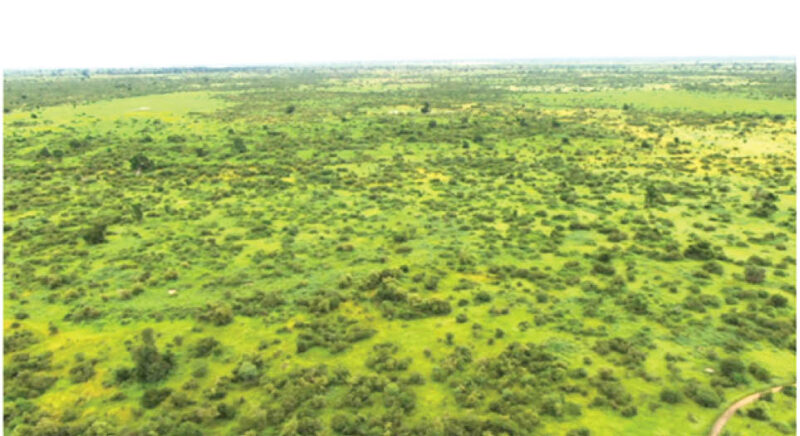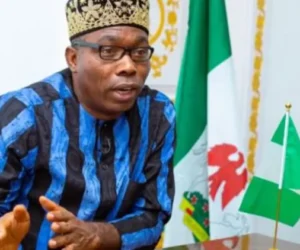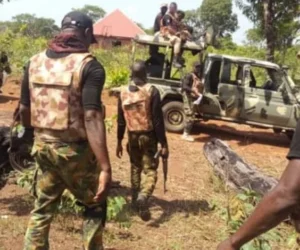North-East Nigeria has endured more than a decade of violent conflict with Boko Haram, whose attacks have devastated communities. Amid the fight against the insurgency, many communities across the region have suffered violation of human rights at the hands of the military. One of such communities is Gallari in Konduga, Borno State.
In a Friday morning raid in March 2014, the military allegedly arrested 42 men from the community without trial. The women and children left behind now bear the heavy consequences of these mass arrests. For the first time, our team travelled to the community to investigate the alleged disappearances in Gallari and discovered that 11 years later, relatives still have no information about the men and have not been reunited with their families. This incident is just one of the many human right abuses that have occurred beyond the terror of Boko Haram.
A 24-year-old Hauwa Bulama hasn’t seen her father in 11 years. He was the head of their village, taken by soldiers alongside 41 other men. The soldiers promised that they would be brought back, but the families have not heard anything since. Hauwa recounted the day her father and others were arrested and the subsequent efforts to secure their release.
SPONSOR AD
“We were not informed of anything. We just saw the military and the Civilian JTF who surrounded our community. When they came, we thought they were only going to search our community and leave. Instead, they arrested everyone. The women then mobilised to the palace of the Shehu of Borno because no man was left behind. The Emir of Borno pleaded with us to be patient, saying our people would be released. He said that since our people hadn’t done anything wrong, they would be freed. But we haven’t heard anything since then. Our people have not returned.
“We went to the Government House, but we were turned back and told that the governor was out of town. They told us that our message would be delivered to him. Up till this moment, we haven’t heard from them, and we haven’t seen our people. We don’t know what else to do. They left only women behind and we have nowhere else to go,” Hauwa said.
Against all odds, Hauwa and her brother, Hassan, led our team on a trip to Gallari, a place now considered a “red zone” due to its vulnerability to attacks. For Hauwa, it was her first time returning in 11 years since she fled the attacks. We walked for two hours through difficult terrain to reach the village from the Dalwa community. Upon our arrival, the village was deserted, every building gone, leaving only the foundations and memories. The sight left Hauwa heartbroken.
She shared her feelings about the journey, saying: “While on our way, I kept remembering my parents and my heart felt heavy with sadness. I don’t want to come to the town again. It is a painful reminder of how our lives once were and now, look at where we are.”
Agony of relatives
The arrest of the 42 men has certainly left many women and children in Maiduguri feeling hopeless. Many women whose husbands were arrested are still left wondering about their fate, while others are missing brothers and other loved ones.
Zara Kona hasn’t heard from six of her siblings since that day. She said remembering them brought her daily sorrow. And she wonders if she would ever see them again.
“Our people didn’t commit any crime, yet, they were taken on a Friday morning. Everyone in the village and neighbouring towns can testify that we didn’t commit any crime. They were forcibly arrested. Many women have grown bitter. Some have lost hope, while others, like Fatima Bulama, still believe their husbands are alive. We just want them to release our children. That’s all we are asking for. Please, help us connect with them if they are still alive, even if they cannot be released. We want to see them with our own eyes again and we will be grateful,” she said.
For 98-year-old Kellu Janga, the memories remain fresh. Her greatest wish is to see her three sons arrested 11 years ago before she dies. “If my children are released today, I will be very happy. If I see my children today, at least I will have peace when I die. I will be very fulfilled in this life if I see my children again.”
A 12-year-old Maimuna Annai dreams of becoming a medical doctor, but after losing her mother to untreated high blood pressure, she now struggles daily to find food. School is no longer a priority, but survival is.
“We are worried about what we will eat, and that is why we don’t go to school. I am always bothered when I see other people going to school while I stay at home. I want them to release my father and give us food to eat,” Maimuna said.
Many families live in grief with nowhere to turn for aid. Some women remarried but were still without care or support; others were even extorted for information about their loved ones.
In 2015, Amnesty International filed petitions calling for an investigation, accusing the Nigerian military of war crimes in the North-East. The allegations of forced disappearance against the military in the North-East are not new to families. While some victims have returned home to their families, many others are yet to be released, and the fates of countless others remain unknown.
Survivors’ tales
In April 2025, three of the Gallari men unexpectedly returned to Maiduguri after more than a decade in detention without trial. The marks of their torture were evident. Mohammed Gudja, now blind, recounted his ordeal. After years of torture, the incident has robbed him of his sight. He still does not know what crime he was accused of.
“They tied us up, leaving this scar before taking us to Giwa Barracks. Upon arriving at the barracks, three of us died on the spot. Those who survived were kept for one week. Then, we were airlifted to Kainji. That was in 2014. When we were taken there, the military manhandled us as they tried to offload us. One military personnel member dragged me and hit my face with his foot. I felt a sound in my head. We were kept there without seeing the sun. At that time, my eyes couldn’t even bear the light of a bulb. We became very thirsty, but there was no water. So, we urinated and drank it.
“Our rights were trampled upon. And we did not know what crime we were arrested for. This challenge is not only ours, it has affected everyone. For those of us who have done nothing wrong, this has weighed heavily on our minds. I haven’t committed any crime, neither have my parents or most of my brothers. We have now grown up. We are not happy about our arrest,” he said.
Like Mohammed Gudja, Mohammed Garba and his brother, Hashim Garba, also bear the scars of assault. Mohammed Garba lost an ear; and their bodies show marks of brutal torture.
While narrating his harrowing experience, Hashim said, “We were kept in a cell block. Sometimes, we were taken out to feel the sun before being returned inside. We didn’t know anything. We were just kept there for 11 years before being moved to Gombe, where we stayed for 9 months.”
Mass arrests not new – Amnesty International
Isa Sanusi, the country director of Amnesty International Nigeria, reacted to the development, saying that mass arrests have been ongoing in the North-East for so long that hundreds of people have been held at Giwa Barracks without trial for 10 years.
He noted that there were similar cases in the North-West: “People are being detained without any reason whatsoever; and this has been going on. This is one of the signs of the human rights crisis we have been experiencing in Nigeria for so long.”
The Gallari case may be the largest documented mass arrest by the Nigerian military, with 42 men taken from one community without accountability, raising serious questions about their credibility and professionalism in dealing with civilians in conflict zones.
Security expert speaks
Dr Kabiru Adamu, a security expert and managing director of Beacon Security and Intelligence Limited, said the Nigerian military and security forces found themselves in a very difficult situation. He explained that asymmetric warfare was new to them, and they were under enormous pressure to deal with it.
“They were under pressure. They didn’t get the buy-in of the communities, and so, what they, in most instances, undertook were actions to protect themselves and to try to get rid of the challenge, including arresting persons on the basis of profiling. Youths, for example, who they felt would be members of a terrorist group, are just mass arrested sometimes on the basis of information or sometimes just on the basis of profiling. It was a reaction to the pressure, which we know today was counterproductive. It led more people to join the group. It also didn’t help with their acceptance, which they needed from the local community,” Dr. Adamu said.
Borno govt dismisses report; military mum
The Borno State Government, through the permanent secretary in the Ministry of Information and Internal Security, Aminu Chanalwa, dismissed reports about cases of enforced disappearance in the state.
He said the state government had progressed and focused on issues of resettlement for communities affected by Boko Haram.
“There’s nothing like disappearance in Borno State. When people are displaced, they cannot even find their family members, so we can say that one is a displacement,” he said.
For the women and survivors of Gallari, hope is fading, yet prayers for justice continue.
At the time of filing this report, our correspondent had not received a response to a formal request sent to the Nigerian military regarding allegations of the mass arrest of 42 men and human rights abuses.
On August 19, 2025, we reached out to the Nigerian military in a letter addressed to the Director of Defence Information, Brigadier-General Tukur Ismaila Gusau, seeking comment on the enforced disappearance of the Gallari men. General Gusau advised that the request should be addressed to the Chief of Defence Staff, a piece of advice that was followed. A subsequent letter was submitted on September 2, 2025. One month later, however, no reply had been received from the military authorities.
Concerns over rising cases of forced disappearance
The executive secretary of the National Human Rights Commission (NHRC), Dr Tony Ojukwu, a Senior Advocate of Nigeria (SAN), on August 30 expressed concern over what he called the the rising cases of forced disappearances, kidnapping and abductions in Nigeria. His statement coincided with the International Day of Victims of Enforced Disappearances.
Ojukwu described the rising cases as a grave assault on human dignity. The International Day of the Victims of Enforced Disappearances is celebrated annually every August 30th to raise awareness of the fate of individuals imprisoned in places and under poor conditions unknown to their relatives or legal representatives.
He noted that the alarming trend has left countless families in anguish and uncertainty, with victims’ loved ones facing psychological trauma and prolonged distress.
Ojukwu said, “Enforced disappearances, particularly in the context of security operations, remain a serious concern.
“These violations not only undermine human rights but also erode public trust in the state’s ability to protect its citizens,” he said.
He added that relevant international human rights instruments, including the International Convention for the Protection of All Persons from Enforced Disappearance, to which Nigeria is a signatory, must be upheld.
Ojukwu reminded the government of its obligation to safeguard the right to liberty, security, recognition before the law, and freedom from torture and ill-treatment.
“The commission urges the government at all levels to adopt proactive measures to address the root causes of insecurity, while strengthening accountability and justice mechanisms.
“We further call on security agencies to strictly adhere to international human right standard in their operations. They must ensure that perpetrators of kidnapping, abductions and forced disappearances are brought to justice.
“They may be missing but definitely not forgotten. Only through a comprehensive response to insecurity—by way of tackling insurgency, banditry, communal violence, separatist agitations and poverty—can Nigeria reduce the tragic phenomenon of missing persons and restore confidence in state institutions,” he concluded.
Watch out for the documentary on the report on Trust TV tomorrow, Sunday, October 12, 2025 at 7:30pm.








